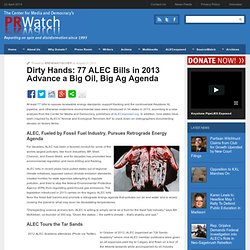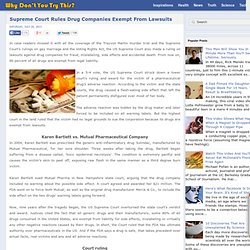

Three Massive Mergers—Millions for One Bank and a Disaster for Food, Water, and Climate by Wenonah Hauter. You probably learned in high school that monopolies are bad for consumers; they eliminate the field of competition in the marketplace, leaving people with fewer options and higher prices.

Mega-mergers in the food and energy markets are allowing a handful of corporations to dominate market sectors. Their market dominance means that when it comes to influencing public policy, politically powerful companies call the shots. As Elizabeth Warren said in a speech recently, competition is dying—and the accompanying consolidation in sector after sector is a threat to our democracy. Mega-mergers in the food and energy markets are allowing a handful of corporations to dominate market sectors.
Beyond the corporate quest for market dominance, there is another reason these mergers keep coming at everyone else’s expense: the deals make big money for the powerful banks that wield enormous power over our democracy.
8 Reasons Young Americans Don't Fight Back: How the US Crushed Youth Resistance. Republished from alternet.org By Bruce E.

Levine Traditionally, young people have energized democratic movements. So it is a major coup for the ruling elite to have created societal institutions that have subdued young Americans and broken their spirit of resistance to domination. Young Americans—even more so than older Americans—appear to have acquiesced to the idea that the corporatocracy can completely screw them and that they are helpless to do anything about it. A 2010 Gallup poll asked Americans “Do you think the Social Security system will be able to pay you a benefit when you retire?” How exactly has American society subdued young Americans? 1. Today in the United States, two-thirds of graduating seniors at four-year colleges have student-loan debt, including over 62 percent of public university graduates. 2. 3. 4. 5. 6. 7. 8. These are not the only aspects of our culture that are subduing young Americans and crushing their resistance to domination.
Dirty Hands: 77 ALEC Bills in 2013 Advance a Big Oil, Big Ag Agenda. At least 77 bills to oppose renewable energy standards, support fracking and the controversial Keystone XL pipeline, and otherwise undermine environmental laws were introduced in 34 states in 2013, according to a new analysis from the Center for Media and Democracy, publishers of ALECexposed.org.

In addition, nine states have been inspired by ALEC's "Animal and Ecological Terrorism Act" to crack down on videographers documenting abuses on factory farms. ALEC, Fueled by Fossil Fuel Industry, Pursues Retrograde Energy Agenda For decades, ALEC has been a favored conduit for some of the worlds largest polluters, like Koch Industries, BP, Shell, Chevron, and Exxon Mobil, and for decades has promoted less environmental regulation and more drilling and fracking. "Disregarding science at every turn, ALEC is willing to simply serve as a front for the fossil fuel industry," says Bill McKibben, co-founder of 350.org. "Given the stakes -- the earth's climate -- that's shabby and sad. " Amy Meyer. Why Don't You Try This?: Supreme Court rules Drug Companies exempt from Lawsuits.
In case readers missed it with all the coverage of the Trayvon Martin murder trial and the Supreme Court’s rulings on gay marriage and the Voting Rights Act, the US Supreme Court also made a ruling on lawsuits against drug companies for fraud, mislabeling, side effects and accidental death.

From now on, 80 percent of all drugs are exempt from legal liability. In a 5-4 vote, the US Supreme Court struck down a lower court’s ruling and award for the victim of a pharmaceutical drug’s adverse reaction. According to the victim and the state courts, the drug caused a flesh-eating side effect that left the patient permanently disfigured over most of her body. The adverse reaction was hidden by the drug maker and later forced to be included on all warning labels. But the highest court in the land ruled that the victim had no legal grounds to sue the corporation because its drugs are exempt from lawsuits. Karen Bartlett vs. Court ruling Critics react But an attorney for the drug companies, Jay P.